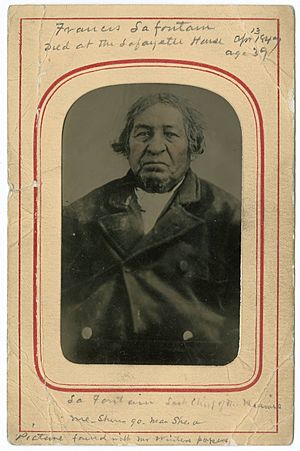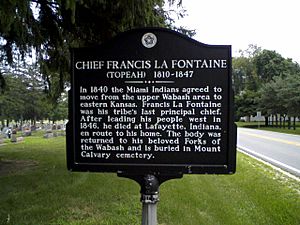Francis La Fontaine facts for kids
Quick facts for kids
Francis La Fontaine
|
|
|---|---|
| Me-Shine-go-me-she-a | |
 |
|
| Miami leader | |
| Preceded by | Jean Baptiste Richardville |
| Chief | |
| Personal details | |
| Born | 1810 |
| Died | 1847 Lafayette, Indiana |
| Resting place | Huntington, Indiana |
| Spouse | Catherine Richardville |
| Children | Esther, Frances, Archangel, Louis, John, Joe, Tom |
Francis La Fontaine (born 1810, died 1847) was an important leader of the Miami people. His Miami name was Me-Shine-go-me-she-a, and he was also known as Topeah, which means "frost on leaves" in the Miami-Illinois language. He was the last main chief of the united Miami tribe. After his time, the tribe split into two groups: the Western Miami and the Eastern Miami.
Contents
Early Life and Family
Francis La Fontaine was born in 1810. His grandfather, Peter LaFontaine, was a French trader. Peter came to a place called Kekionga in 1776 from Fort Detroit. He and another man, Charles Beaubien, married Miami women. They also showed their loyalty to the Miami people.
In 1828, when Francis was 18, he became the chief of his Miami village. That same year, he married Catherine. She was the daughter of another important chief, Jean Baptiste Richardville.
Leading the Miami People
Francis La Fontaine and Chief Richardville worked closely together. In 1840, they helped create a treaty. A treaty is a formal agreement between groups or nations. This treaty meant that about half of the Miami nation would move. They would go to an area west of the Mississippi River.
When Chief Richardville passed away in 1841, Francis La Fontaine became the new main chief of the Miami. He moved his family into Richardville's house. This house was located at The Forks Of The Wabash. It also served as the main office for the tribe.
The Tribe's Split and His Legacy
In 1846, the Miami nation was divided. Even though the treaty allowed La Fontaine to stay in Indiana with the Eastern tribe, he first traveled with the Western tribe to Kansas. On his way back, he died in Lafayette, Indiana. His body was brought back to the Forks of the Wabash. He is buried in Mt. Calvary Cemetery near Huntington, Indiana.
Catherine La Fontaine, his wife, died two years later. Francis and Catherine had seven children. Their names were Esther, Frances, Archangel, Louis, John, Joe, and Tom. The younger children were cared for by the Roman Catholic Church. The sons received their education at the University of Notre Dame. This was part of a payment for a loan Francis had given the school. The La Fontaine family owned their house until 1941. Today, a group called Historic Forks of the Wabash, Inc. takes care of it.
Images for kids
 | Mary Eliza Mahoney |
 | Susie King Taylor |
 | Ida Gray |
 | Eliza Ann Grier |




